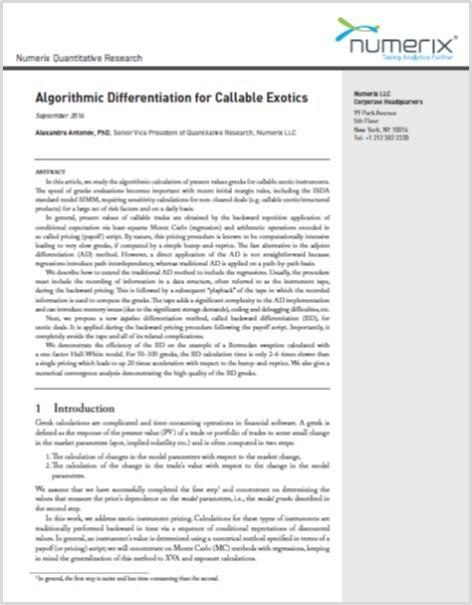
Algorithmic Differentiation for Callable Exotics
In this article, we study the algorithmic calculation of present values greeks for callable exotic instruments. The speed of greeks evaluations becomes important with recent initial margin rules, including the ISDA standard model SIMM, requiring sensitivity calculations for non-cleared deals (e.g. callable exotic/structured products) for a large set of risk factors and on a daily basis.
In general, present values of callable trades are obtained by the backward repetitive application of conditional expectation via least-squares Monte Carlo (regression) and arithmetic operations encoded in so called pricing (payoff) script. By nature, this pricing procedure is known to be computationally intensive leading to very slow greeks, if computed by a simple bump-and-reprice. The fast alternative is the adjoint differentiation (AD) method. However, a direct application of the AD is not straightforward because regressions introduce path interdependency, whereas traditional AD is applied on a path-by-path basis.
We describe how to extend the traditional AD method to include the regressions. Usually, the procedure must include the recording of information in a data structure, often referred to as the instrument tape, during the backward pricing. This is followed by a subsequent “playback” of the tape in which the recorded information is used to compute the greeks. The tape adds a significant complexity to the AD implementation and can introduce memory issues (due to the significant storage demands), coding and debugging difficulties, etc.
Next, we propose a new tapeless differentiation method, called backward differentiation (BD), for exotic deals. It is applied during the backward pricing procedure following the payoff script. Importantly, it completely avoids the tape and all of its related complications.
We demonstrate the efficiency of the BD on the example of a Bermudan swaption calculated with a one-factor Hull-White model. For 50–100 greeks, the BD calculation time is only 2–6 times slower than a single pricing which leads to up 20 times acceleration with respect to the bump-and-reprice. We also give a numerical convergence analysis demonstrating the high quality of the BD greeks.
Complete the form to download this research paper, “Algorithmic Differentiation for Callable Exotics”
Author: Dr. Alexandre Antonov
In this article, we study the algorithmic calculation of present values greeks for callable exotic instruments. The speed of greeks evaluations becomes important with recent initial margin rules, including the ISDA standard model SIMM, requiring sensitivity calculations for non-cleared deals (e.g. callable exotic/structured products) for a large set of risk factors and on a daily basis.
In general, present values of callable trades are obtained by the backward repetitive application of conditional expectation via least-squares Monte Carlo (regression) and arithmetic operations encoded in so called pricing (payoff) script. By nature, this pricing procedure is known to be computationally intensive leading to very slow greeks, if computed by a simple bump-and-reprice. The fast alternative is the adjoint differentiation (AD) method. However, a direct application of the AD is not straightforward because regressions introduce path interdependency, whereas traditional AD is applied on a path-by-path basis.
We describe how to extend the traditional AD method to include the regressions. Usually, the procedure must include the recording of information in a data structure, often referred to as the instrument tape, during the backward pricing. This is followed by a subsequent “playback” of the tape in which the recorded information is used to compute the greeks. The tape adds a significant complexity to the AD implementation and can introduce memory issues (due to the significant storage demands), coding and debugging difficulties, etc.
Next, we propose a new tapeless differentiation method, called backward differentiation (BD), for exotic deals. It is applied during the backward pricing procedure following the payoff script. Importantly, it completely avoids the tape and all of its related complications.
We demonstrate the efficiency of the BD on the example of a Bermudan swaption calculated with a one-factor Hull-White model. For 50–100 greeks, the BD calculation time is only 2–6 times slower than a single pricing which leads to up 20 times acceleration with respect to the bump-and-reprice. We also give a numerical convergence analysis demonstrating the high quality of the BD greeks.
Complete the form to download this research paper, “Algorithmic Differentiation for Callable Exotics”
Author: Dr. Alexandre Antonov
Authors

Dr. Alexandre Antonov
Dr. Antonov received his PhD degree from the Landau Institute for Theoretical Physics in 1997 and joined Numerix in 1998, where he currently works as a Senior Vice President of Quantitative Research. His activity is concentrated on modeling and numerical methods for interest rates, cross currency, hybrid, credit and CVA. Dr. Antonov is a published author for multiple publications in mathematical finance, including RISK magazine and a frequent speaker at financial conferences.


